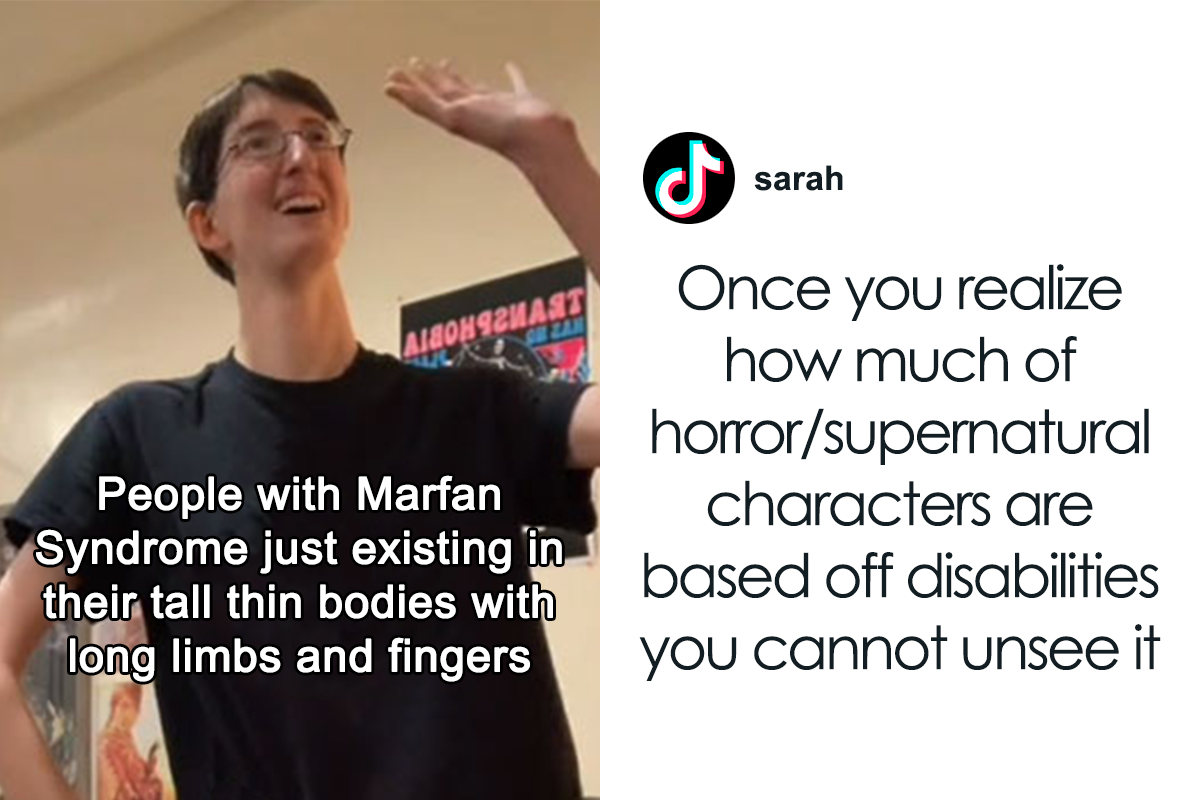
“Are We Really That Scary To Y’all?”: Person With Marfan Syndrome Goes Viral With 1M Views For Calling Out Horror Writers’ Choice In Monster Design
Interview With AuthorThere’s something quite charming about horror films, isn’t there? The juxtaposition of being frightened and alert with the fact that you’re underneath the soft blankets of your pillow fort, knowing that nothing can actually harm you, is one that brings about a very particular kind of pleasure.
However, this can be compromised when you feel as though you’re relating more to the monster rather than the protagonist, and not in a villains-are-far-superior-kind-of-way. When the only fictional character to reflect your body shape is a horrendous creature everyone tries to run away from, one may start to question—why in The Shining is this the norm?
One TikToker, named Christopher Ikonomou, had just this question. It seems that many horror writers have noticed Marfan syndrome and decided to take some inspiration from the disability and into their monster design. Christopher believed it was about time they got called out for it.
He made a TikTok, it went viral, a discussion on disability representation in film ensued, now we’re here! We got in touch with Christopher to ask some questions about it all and he very kindly agreed to answer them. So, dear readers, make sure you stick around for it all, and leave your opinions in the comments below. Let’s get into it!
Christopher Ikonomou, a 21-year-old student living with Marfan syndrome, is calling out horror writers for modeling monsters after people with disabilities
Image credits: cpikoart
To be different in a world that prefers perfection is tough, especially when you’re young and fitting in can be the difference between having an epic childhood and one that would rather be forgotten. When you’re an adult, you have more choice in company and authority to tell people to find the highway to hell if they’re being insensitive. Or mayhaps, tell horror writers to find more creative ways to portray monsters that won’t condition a whole generation of people to stigmatize those, which resemble them in real life.
This is the story of Christopher Ikonomou, a 21-year-old student living in Los Angeles. There’s many aspects which make Christopher unique, yet the two that we’ll be focusing on today are his love for horror movies and a disorder he lives with, called Marfan syndrome. Interestingly enough, these two have collided in an intriguing way, causing a very needed discussion to take place.
Marfan syndrome is an inherited disorder that affects the fibers that support and anchor the organs, such as the heart, eyes, blood vessels and the skeleton itself
Image credits: cpikoart
According to Mayo Clinic, Marfan syndrome is an inherited disorder that affects the fibers that support and anchor the organs and other structures in one’s body, such as the heart, eyes, blood vessels and the skeleton itself. It is caused by a defect in the gene that enables the body to produce a protein that helps give connective tissue its elasticity and strength. It can either be inherited or developed spontaneously.
People with Marfan syndrome are usually tall and thin with incredibly long arms, legs, fingers and toes. The risk of abnormal curves in the spine, such as scoliosis, foot and lower back pain, as well as eye issues, such as retinal detachment and lens dislocation, and serious heart issues are just a few of the complications that can follow the diagnosis.
If the large blood vessel that carries blood from the heart to the rest of the body is affected, the condition can become life-threatening, requiring medications and preventative surgery to keep everything under control. Christopher himself had an aortic root replacement this year.
Image credits: cpikoart
Image credits: cpikoart
The condition affects not only the appearance of the body but carries various complications, such as scoliosis, foot pain, eye and heart issues, and more
Image credits: cpikoart
The condition can lead to more than just medical complications, especially when we consider how unforgiving society can be to those that look different. “I have experienced a lot of bullying growing up and in my adulthood because of my visible illness, and much of it manifests as people seeing me as an inhuman creature,” Christopher told Bored Panda, revealing that dozens of people with Marfan have contacted him to share the fact that they’ve gone through the exact same treatment.
“Despite the negative comments and incessant staring I’ve experienced from nondisabled people, I have come to love my body and am proud to be who I am,” he said. “I often reclaim the idea of being a scary disabled person or a ‘freak’—but I know we all deserve better because we are not the monsters many compare us to.”
He believes that most of the hostility stems from a poor depiction of Marfan syndrome in media. “People see these representations in horror films and it implicitly affects how they treat people who look like those monsters in real life,” he continued. “This then creates a positive feedback loop where our bodies are reinforced as innately unsettling and more writers decide to use us as inspiration to evoke that feeling in audiences.”
The syndrome can become life-threatening, requiring medications and preventative surgery. Christopher himself had an aortic root replacement this year
Image credits: cpikoart
@cpikoart T-2 weeks until aortic root replacement surgery! 🫀 #MarfanSyndrome #ChronicIllness #Disabled #HeartSurgery ♬ Blade Runner 2049 – Synthwave Goose
Having been subjected to bullying and incessant staring, he believes that most of the hostility stems from a poor depiction of Marfan in media
Christopher decided to take a dig at horror writers using people with Marfan syndrome to inspire their monster designs in a TikTok he posted on December 8th. Soon, the video went viral and, at the moment of writing, has over 1M views. It opened the eyes of many to an issue that’s very rarely spoken about and that is the representation of disabilities on film.
To give some context to the genre itself, ‘strange,’ ‘grotesque,’ and ‘dangerous’ are some of the ways to describe the perfect horror movie villain. Neil Chase, award-winning screenwriter and author of the horror-western novel Iron Dog, argues that the way to write monsters is to consider the fear of the unknown, the feelings of being out of control, and the primal human instinct to survive.
However, whether it happened consciously or by accident that the main monster in the film resembled someone with Marfan, is not as important as the impact it has on those that feel misrepresented and taken advantage of.
Being a huge horror movie fan (can relate!), Christopher would like the genre to become more aware of the impact it has on people with disabilities. “My criticism comes from a place of care; I want more people to fall in love with the genre like I have, but these representations push people like me away,” Christopher said.
Being an avid horror fan, he noticed the monsters that looked like someone with Marfan syndrome. In movies such as “Rec” (2007)
Image credits: Filmax
One of the films that Christopher told Bored Panda about was Rec, a Spanish found-footage film about an infection ravaging a small apartment complex, and the empathy he felt towards the antagonists.
“The patient zero and final infected person we meet is Tristana Medeiros, a girl who has been held captive and experimented on. When I saw her, I couldn’t help but literally see myself, in her height, her knocked knees, her disproportionately long and thin limbs and fingers, even her posture (one I walk with having undergone spinal fusion surgery),” he explained.
“I understood why people jokingly (and sometimes cruelly) say I look like her, because I do. Not because of anything to do with her character, or the plot of the film, but simply because of her body. I empathize with her just as I had with the other victims of the film, while the rest of the world sees her as a terrifying antagonist.”
Other examples of films that feature monsters with Marfan syndrome–inspired looks include Mama, Slender Man, It, and The Conjuring 2. Interestingly enough, all of the characters are played by the same actor—Javier Botet—who actually has Marfan syndrome, however, one should also note that there are other actors who don’t have Marfan, playing similar characters as well, such as Doug Jones in The Bye Bye Man and Carel Struycken in Gerald’s Game.
“Mama” (2013)
Image credits: Universal Pictures
“Slender man” (2018). “The only way people are being conditioned to see my body is through a terrifying monster or villain,” Christopher said
Image credits: Sony Pictures Releasing
Now, to be the Devil’s advocate for a split second, horror comes in all shapes and sizes, and it can be argued that each sub-genre of monster has a root in real life. Clowns, dolls, zombies, witches, mummies…they all tap into the unknown. Mayhaps the issue lies with the fact that we as a society are highly conditioned to see a very narrow set of people that fulfill the requirements of normality?
“I think the problem definitely starts with our bodies not fitting into the ‘ideal,” Christopher said. “Very few people fit the ‘perfect’ body set by societal standards, but many marginalized groups experience a step further than that. It’s one thing to not fit in; it’s another to have people actively portray your body as evil, demonic, or scary.”
“It” (2017)
Image credits: Warner Bros. Pictures
Potentially the most important thing to note here is the fact that we rarely see a disabled person being portrayed in the media whose personality and storyline don’t revolve around the disability itself. Annie Segarra, an advocate for disability rights, argues that mainstream movie characters with disabilities are either portrayed as being tragic and depressed, or they exist only to further the narrative of the (typically able-bodied) main character, sending a message that people with disabilities are incapable of living happy and successful lives.
Furthermore, as Christopher continued to explain, monsters in horror films are the “majority of the ‘representation’ people with Marfan syndrome get in the media,” which conditions viewers to associate bodies of those with Marfan with those of a terrifying monster or villain.
“I am not saying that actors should be ashamed to play these roles or that these films are inherently terrible. I am saying that people with Marfan should be represented across all roles and characters, and until then, the way these monsters are designed will continue to have a negative impact on how people see our community, even if it’s unintentional or implicit. My only hope is to raise awareness of how it affects us and hope some writers at least consider it.”
“The Conjuring 2” (2016). Christopher is raising awareness on how this affects the community, hoping that it’ll inspire some horror writers to think twice
Image credits: Warner Bros. Pictures
Hundreds of people supported the message of the viral TikTok, yet there were those that didn’t see the issue with such monster designs, arguing that horror writers are just trying to invoke a fear of death, the design having nothing to do with villainizing real people with disabilities.
“It’s a valid perspective and I don’t want to take away from other people’s opinions on these depictions, however, intention doesn’t erase impact,” Christopher said in response. “In the end, these monsters parrot Marfanoid features in an attempt to look creepier and scarier, even if the writer doesn’t know the symptoms by name.”
“Could it be a coincidence? Absolutely. Does that erase how people perceive the character and, therefore, real people who look like that? I don’t think so, especially when productions purposefully seek out talent with those symptoms to portray the characters (i.e. hypermobility, ‘unusually’ long limbs and fingers/toes, extreme thinness and height, etc). This connection may be unintentional, but because our community literally has no other representation in media, it has a real and scary impact.”
He continued to say that “when we are exclusively represented this way, it bolsters people’s implicit bias about disabled people and further pushes us outside of the norm in the real world. (And honestly, I don’t want people to look at people like me and fear death!)”
People with Marfan should be represented across all roles and characters, and until then, these monster designs will continue to have a negative impact on the community
Image credits: cpikoart
The time is now for the film industry to open up their doors to the largest minority population in the world. The industry needs to take advantage of an untapped market that can authentically add another layer to film and TV shows, and as Lawrence Carter-Long states, imperfect beats absent.
More accurate portrayals in movies and pop culture, and the inclusion of disabilities in people’s experiences, may lead to the stigma surrounding disability to dissolve. By questioning the world around us and pushing for change, we can evolve into a better functioning and more accessible world for all.
You can watch the viral video, which started the discussion on disability representation in film, here:
@cpikoart Like damn are we really that scary to y’all, give it a rest 😭 #horror #fyp #HorrorVillains #HorrorMovies #HorrorFan #REC #IT #Mama #Barbarian #JavierBotet ♬ original sound – Christopher (xe/he)
Thanks to Christopher, we can start having more discussions that may actually lead to change! He would like the Marfan community to know that “you deserve to feel human and to see positive depictions of yourself on screen. You are not a monster and you are not alone.”
He also asks the rest of society to consider this perspective and the impact monster design has on an overshadowed group of people. “At this point in time, only 2% of on-screen characters are disabled and 1% of writers in Hollywood are disabled despite disabled people making up 26% of the US population. There are so few of us actually in the room when these characters are created. I hope sharing my perspective broadened yours so that we are not the only ones speaking up. Just as you deserve to be seen in your entirety, we do as well.”
We wish Christopher all the best in his endeavors in the future! Let us know your thoughts in the comments below and I wish you all a great day!
Hundreds of people showed their support for Christopher, whilst also making fun of horror writers
However, there were those that disagreed, seeing nothing wrong with this type of monster design. Let us know your thoughts in the comments!
Image credits: www.facebook.com
This is absurd. Nobody that watches a horror film containing monsters is associating them with disabled people. This really is overreaching. Most of these "monsters" aren't supposed to depict disabled people's bodies nor do they encourage inaccessibility, they're supposed to depict the uncanny, the frightening, the impossible like corpse, zombies, vampires, the paranormal. I'm certain nobody is looking at Christopher and thinking xe looks like a zombie spirit. In any case it's HORROR, it's not supposed to be wholesome. If it triggers you ,JUST DONT WATCH IT. is the director supposed to consult with the 8 billion people on the planet and learn what offends them before putting anything in his movie?
Blows my F*****G mind what some folks are triggered by...
Load More Replies...While I simpatize and can see where he is coming from, this post alone proves that his assumptions are an overreach. Looking at these pictures alone doesn't cause fear (maybe the blister one causes a little disgust). What causes fear and what turns someone into a villain is the plot. We are afraid of a shark that remains mostly unseen because of a song. None fears these characters alone. He should redirect his energy elsewhere in my opinion
The actor who plays these characters has the same condition. He seems just fine with it. Everyone needs to relax and realize the world cannot coddle you.
I'm pretty sure Joey Ramone had Marfan's too. He also had a parasitic twin surgically removed from his back. Both I would think could be in horror movies, however he was just so wonderfully talented and the furthest thing from scary. I MISS YOU JOEY!
Load More Replies...While I am against using disabilities to represent or present evil, the tall lanky figure has appeared in horror and folklore way before Marfan Syndrome(first recognized in 1955) was even recognized. As someone with a disability my, I recognize how disabilities can have health affects. But no one is saying that a character is a monster because they appear to have Marfan Syndrome. It’s like saying a person is a sociopath/psychopath for having autism or people with porphyria are vampires. Before I even knew about Marfan Syndrome(learned about it when I was around 10-12), I had heard folktales about lanky creatures from all over the world. Just because there is a similarity to a disability, doesn’t mean something is based off of it. Also, Javier Botet is a good actor, especially in horror movies.
It's also reasonable to be scared of something that's bigger than you in the wild, so it makes sense that horror movie monsters are big.
Load More Replies...This imagery is mainly due to the fact of the characters he uses examples of, 3 of the 4 are portrayed by the same actor....who has marfan syndrome
Yeah, whatever. “Let me dig for something to be offended by today.” 🙄 Lol, what a reach.
I've watched a lot of horror movies. I don't think I've ever thought of the 'monsters' as resembling disabilities except for the obvious like a zombie missing some limbs. I see it more as writers going for the uncanny valley effect. As in, something sort of human looking but somehow 'wrong' in terms of how most humans look. And sometimes opposite - like innocent little girl is monster (e.g. The Shining). But my brain is able to distinguish between a fictional monster and a person on the sidewalk with or without a disability. And IRL the scary humans are the ones with violent mental health problems, not the ones with extra long fingers.
I think the point us, that uncanny valley is based on your expectation and experiences of what humans look like. We know there are people with features that are less common but if we see some monster without nose or with non average limbs our mind does not jump to a disability because we are in a horror setting and don't expect it to be human.
Load More Replies...So to this man and everyone who agrees with him, what should monsters look like? How should they behave? How should they talk? I really didn't think fictional monsters could be this problematic🙄 (damn typos)
Javier Botet, the actor who portraits all those characters, is also a film director and illustrator who regularly appears in Spanish media and gives insight on what Marfan syndrome is and speaks about his work, and l think he's shaken off the stigma the condition has far more effectively than this dude on Tik Told. But what do l know...
I appreciate his point, but disagree. It's the make up, costuming and framing narrative that makes horror movie monsters into monsters not the body shape so much.
SMH. The real reason for this is most likely due to the Unvanny Valley. The more something scary looks like a human, the scarier it is. Height-wise, making a tall monster is logical because it’ makes a monster more intimidating. (Not really sure why the monsters have to be skinny though. I know I would soil my pants faster if SlenderMan was ripped)
I think skinny monster remind us of things like spiders, corpse, decay, illness (in the sense of dying a slow death)
Load More Replies...5 examples in the whole genre barely make a coincidence, let alone a pattern.He can be triggered, but doesn't mean he's right.
Especially when like 4 of them are the same dude, Javier Botet who is also a director 💀, who has the syndrom and just looks Like That and loves horror.
Load More Replies...This guy needs to reach out to Doug Jones, an actor who also has Marfans and who's famous for playing the very monsters this guy has taken issue with. Maybe Doug could help this man get a better perspective on how others see his condition.
Love Doug Jones. Great actor and definitely underrated.
Load More Replies...They’re scary because they look dead or demonic. Not because they’re tall and slim. If that was the case, everyone would be in a fullfucking panic during NBA games.
Okay so no more horror movies with creepy monsters. Check. Oh, and we cannot have any films with psychotics or anyone with any type of mental illness (I'm Bipolar w/Borderline Personality Disorder and have PTSD). And no more really skinny folks or fatties (I weight 385lbs.). Or anyone with anything that may or may not offend someone somewhere. Does that about cover it?
I have a series of charcoal drawings of monsters that I saw when I used to get visual hallucinations (my audio ones won't go away for some reason) and a lot of them are of long limbed fellows but they have nothing to do with humans with disabilities. If I subconsciously based them on someone, it would probably have been my dad who's very scary and also very tall. Were I to show the pictures to people without explaining that part will I start being accused of being ableist, even though I myself also have a physical disability? That seems like a massive stretch to me, no pun intended.
There's nothing wrong with educating people about Marfan Syndrome. I only learned it existed a few months ago when my dad found out he had it (not very pronounced but he did require an aorta valve replacement that he's still recovering from) That said, kids are jerks (even the author of this post points it out) and those who didn't learn right from wrong go after differences of all kinds. I get that horror movies have sometimes leaned on physical differences and portrayed them as grotesque (take Freddy Krueger, for example) and that doesn't do a service to serious burn victims, but it's also not why Freddy haunted my dreams. I myself tend to prefer jump scares and effects over just making someone look scary, but then again you can pretty much go after anything. Ghost child (lack of skin pigmentation), sudden jerky motions (involuntary movement disorder) and the list goes on.
OMFG Jason was not right and Freddy had a burnt face. Must have been making fun of them all years. I never realized it now I am going to boycott all Horror movies. Makes me soooo mad that those characters also happend to be homicidal maniacs. FFS this is stupiest s**t I have seen today and I have seen some stupid s**t today. Get over yourself OP, you are drawing attention to YOU not anyone else ffs.
In my personal experience, not many people know of Marfan's Syndrome. I myself never heard of it until I met my wife. And because many people don't know of it, they make fun of people with the long arms, the crooked back from scoliosis and so forth, especially the younger generation. What normally shuts them up is when I drop a comment in the line of "Do you know you are making fun of a physically disabled person?" I don't watch horror movies, and until today I didn't notice the similarities between horror characters and people that do suffer from Marfan's. And it got me thinking: How would people feel if they recognize aspects of down syndrome people in horror movies? Or Ehlers Danlos Syndrom? Fragile X syndrome? Klinefelter Syndrome? Or any syndrome that makes its patients look "different" from non-sufferers? I feel that people in general should be sensitized to these syndroms, because whispered comments and looks do hurt.
I hope this person knows that most actors cast in these roles HAVE MARFAN SYNDROME. Javier Botet has been cast as the monster in so many different parts and has the same condition. This isn’t bad representation, this is reaching.
So ...should I be offended by hawklike witch noses because I have one of those? As long as adults don't come mocking me I just don't care and the kids that did grew up eventually.
Serious question: If there were ZERO monsters/antagonistic characters in horror movies with physical traits resembling people with this condition, would there be an outcry for Hollywood to MAKE some, in order for equal representation? 🤔 Or is the complaint not that there are some movie monsters with these characteristics, but that there aren't many NON-monster characters with these characteristics? That argument I can certainly understand, but if this person just doesn't want ANY horror characters to EVER have these characteristics, then I don't see the logic.
Imagine how disabled soldiers feel about war movies.
Load More Replies...I'm not going to lie. I have Marfan's syndrome as does my mum and grandmother... I do not look at slender man and go 'argh you're making fun of me'... some character designs are hurtful towards disabilities but tall and thin is not associated with disabilities, it is skeletal and alien, usually the proportions are incredibly unique... bringing awareness to issues is good but... I think this was an overraction.
A lot of people are missing one of his big points: that villians shouldn't be the only time his body type is seen. Using people of all shapes and sizes should be seen more in mainstream media, thus humanizing them to more people.
Except like 4/5th of the examples he gave is the same dude, Javier Botet, who is also a director and has the syndrome, and loves playing these roles, as well being an awareness activist for the disorder... If you wanna make that statement, make a fking tiktok focused on wanting more people with the condition in normal roles rather than b*tching about someone with a disability playing the roles he wants to play...
Load More Replies...Some people just aren't happy unless they're finding reasons to be offended. So many horror characters have come in many different shapes and sizes. The guy who played Mike Myers in Rob Zombie's Halloween was 6'9". I don't believe he got all offended saying, "What, so tall people are monsters to you?" All sorts of average people have been horror monsters, too. I bet this kid spends half his time saying people who are different should not be discriminated against, but then when they're not discriminated against, he gets offended.
I draw monsters for a living. I get paid to do it. I've never looked at one of my gangly monster designs, and thought to myself "Hmm, yes, this is obviously the anthropomorphic personification of anorexia, dementia, and severe PTSD." I understand that it can happen, but typically it's intentionally done, as it will fit the subject matter. It's the same principle of thinking fantasy races have to have real-world analogs.
Here we go again. I doubt very much that an illustrator draws his pictures after someone he has probably never seen. Again - here we go with the "I have this, so you can't do that." syndrome. Pretty soon we won't be able to read, write, draw, or speak because there will be someone out there - somewhere - who wil find it offensive.
Worse even. The dude in most of these roles is Javier Botet, an actor, writer and illustrator WITH the condition. So it's actually 'I have this, and despite you also having this you can't do that because my feefees are more important than yours'.
Load More Replies...Most people don't know about such disabilities. I did not until now. I think it's reaching to accuse horror movies and the writers of using people with disabilities to create monster. That never crosses my mind when watching any movies. Unless that's what the movie is about. To be bullied, judged for a disability, is wrong. But saying people are purposely making a disability in a negative to make a villain in movies. They have their own imagination and have their own idea of what ALL the characters will look like.
These fantasy creatures aren’t based on people with this disability, they just happened to be played by people who have this condition. People with marfans are just very tall and definitely dont look like a zombie or creature! It does suck if people stare at you and are mean because you’re really tall, im the opposite and get teased for being really small but it’s nothing to do with horror movies?
That's incredibly stupid. As far as deformed bodies go, I had a crush on Billy from Hocus Pocus. A ZOMBIE. Nobody looks at Marfan sufferers and thinks "eeek, a villain!" We might be wary of them as the human brain is wired to accept the "normal". To go a step further and to accept the different; now this is the task of parents, school, etc. The human mind seeks the proportional and symmetrical. If this is distorted, then voilà, we have a monster. That's why mummies, zombies, etc... are great horror monsters and skeletons - being symmetrical - not so much.
I'm disabled and I love to write and draw myself into horror monsters and I often think as long as it was regulated I'd love to work in a freak show/horror circus if they still existed. It's true I do have issues with seeing myself as "a monster"/something bad but to me that has more to do with lack of inclusion (never seeing no one like myself anywhere, constantly being treated like an aberration by doctors) than with horror representation. I agree with a trans woman I heard talking about the trans villain in a horror movie "who doesn't want to fantasize with being the villain?". To me it's a power fantasy that I love and sometimes I wish people would in fact fear me irl like they fear monsters in horror, that'd be way better than being treated like r******d.
Anthropologically, humans react negatively to other humans that do not look like an average human due to very real biological affects, such as disease. While evolving, any human[oid] that was weak (diseased) would die, we are programmed to survive. So it is written into our genetics to have a fearful response to anything that could kill us, whether that's an animal or a human with contagious disease. With this, writing horror means depicting human-like creatures with features reminiscent of death (super skinny, crouching over = sick/disease or old, tall = superior entity that can kill smaller, etc). So, really, there will never be a full stop to horror movies with creatures that have traits of disabled people because we biologically fear disabilities and/or anything that is not 'normal' healthy. I agree, as a whole, there should be disability awareness.
The reason horror characters are made to look like that is because of the uncanny valley. It's psychologically unsettling to people to see things that resemble humanoids but with something "off" about their body. The long limbs and exaggerated features is because of this. Nobody looks at a disabled person and is like "huh. spooky. lemme add this to my movie."
I get what he's saying, and I feel bad that he happens to look/have physical attributes that creep people out, but horror movies did not MAKE people view him as "creepy".
If I ran into the Slender Man in a dark alley I would be terrified!!! If I ran into this Chris guy in the same alley I would probably give him a head nod and keep walking. No one associates film monsters with disabled persons. I suppose horror movie will be forced to have disclaimers that say "monsters in this film resembling persons with disabilities is purely coincidental" (eyeroll)
I dunno, just because you see yourself in something doesn't mean the entire world has used you as a prototype for something that's been around for ages. I'm all about nixing the ableist attitudes. But this kind of rhetoric is what idiots glom onto when they attempt to disparage "woke" culture. Now we can't have scary movies? I'm drawing the nonsense line right now. What's next? Every villain that has brunette hair is a dig at all brunettes being evil? I just have to stop it somewhere.
So people who didn't know such a condition existed based their designs off it how?
I always thought that tall skinny monsters with long fingers were actually mean grown ups seen from scared child's perspective
Ooookay... So... Marfan Syndrome isn't monstrous - never thought so, never will - except for my sympathies on all the medical issues that come with it (it's like winning the most inconvenient lottery ever). I'm trying to think of what kind of 'monster' design that is still humanoid... that wouldn't depict some sort of disability in some way??? In fact, isn't one of the most employed/famous horror actors (Javier Botet) so successful DUE TO having this condition?
I don't associate horror monsters with people with disabilities. I think this is FAR less of a problem than people's stereotypes of schizophrenia or a "split personality" (dissociative identity disorder) thanks to horror films. Movies like "Split" for an obvious example, really, REALLY p**s me off as someone living with DID and Schizophrenia. It's always this b******t twist that "oh the killer has a personality disorder/schizophrenia". F**K OFF WITH THAT NONSENSE ALREADY. UGH.
I can see what Christopher means and that he wants to end negative stereotypes about disabled people, but I don't agree. Never in my life I associated horror monsters with disabled people. I think monsters were designed to look very close to human, but with unsettling, corpse-like appearance. No one see disabled person and immediatelly think of horror monster.
I understand this totally. I do not think people, in general, see disabled as monsters. In fact, until I saw this, I never associated the monsters with Marfans because they were not people, but characters that were not human. But I don't live with the bullying or the sudden realization that an actor that has the same thing portrays these characteristics. Nonetheless, I'd like to reassure our friends who just happen to have this or any disability, that we see you for you, not the physical traits. And to the bullies, I hope Christopher pokes your eye out. He seems pretty cool to me.
Well in a spate of replies loaded with terms suc as triggered and coddle, he can expect no support here apparently. Once more, it is upsetting if you only ever see people like yourself depicted as villains, and while children can be cruel, adults can have the empathy of rebar.
That's ok, xe already has tons of support in tiktok. Obviously not horror fans
Load More Replies...I know I’m going to get downvoted for this, considering the comment section, but it is astounding to me that people are saying “oh, xe is looking for stupid things to be triggered by.” Yes, I do think that saying horror movie writers are basing their characters off of people with Marfan Syndrome is a massive overreach. However, there is no denying the fact that because of this depiction, people can associate those with Marfans as scary. Xe probably deals with this daily, and I bet it sucks! Also, did people not read the article? The main thing xe said is that xe wanted to raise awareness. In fact, xe said that xe didn’t think these movies were terrible at all! The whole point of this is to have others understand how people with Marfans can be incredibly negatively affected, and how there needs to be better representation.
Lack of visibility in general is often the problem, with a dearth of people with disabilities being cast in roles. I think there's a teaching moment here but the lesson shouldn't be to eliminate human or human-like characters in horror movies because that is the cause of bullying and name-calling.
If ur looking for a TV show that involves a disabled person in a way that doesn't directly relate the disability to the storyline, I recommend The Healing Powers of Dude (on netflix)
I think this is one of those "you have to be in his shoes to know how it feels" but you can also understand fine without having to. He turns on scary movies, he sees someone who looks like him and is disappointed that that person is immediately the bad guy/antagonist largely because of the "abnormal" limbs. I see where he's coming from. If he wants to make a big deal out of it, good for him. It's not hurting anybody.
okay but for some reason this video made me realize that my type (tall, long fingers+limbs) correlates with this syndrome which correlates with horror movie monsters... except i didn't know about this syndrome until now. so uhhh i'm hoping that the thing i have for long-limbed tall people is not caused by horror monsters??
As a white guy, I take it personally whenever there's a white villain. See how absurd this game is?
My daughter (28) has Marfan's. In fact, the doc at John Hopkins said she is a poster child for Marfan's when he first laid eyes on her. I am a horror genre fan. Never once did I see a tall, lanky skeletal looking creature and say, "Hey, that reminds me of my kid!"
as a 7'4 tall albino skeleton skinny, type of guy, I LOVE BEING SCARY! I love that I look like those in horror {slenderman and such} I was told all through my childhood that I was a "Demon" for how I looked Even lost my Mother to a man that got too "scared" of me, But I grew up and ran with it. IM A MONSTER/DEMON AND PROUD OF IT! {Also a lot of "monsters look like that, cause there DEAD, and their bodies can't hold up, making the look, have you ever tried to stand up a dead body on its feet? it crumples down, making odd joints and movements {please don't ask how I know}
This is sad. I've never liked horror movies, but basing monsters off of people with disabilities is just SO wrong. Like c'mon guys, surly there are other places you can look for inspiration. Stop trying to hurt people.
hi I'm someone with a connective tissue disorder too! I don't have marfan syndrome but I do have ehlers-danlos (all signs point towards it being classical-like EDS but I haven't gotten testing done yet). the disorder I have has hypermobility (what most able-bodied people refer to as double jointed) as a key symptom. the amount of horror scenes I've seen where monsters contort in the same ways I can makes me a bit sad. "this monster is not human, let's make it move in a way humans don't" seems to be the thought behind it but whenever scenes like this pop up, my friends/family rarely ever don't say the obvious... "hey that looks like Dande! hey Dande, can you move like that?"
people like me are either seen as freakshows, monsters, or a party trick. we're not offended over horror movies or the people that watch them, we just simply want to be seen as normal
Load More Replies...I feel like most comments here are mean-spirited. This is mostly this guy saying the only rep he sees for himself is horror. Which is reasonable to be upset by! I have a disassociative disorder and all my rep is basically "ooh scary evil multiple personalities!!" dude can want more rep that doesn't revolve around how he's scary.
I have a friend who's sister was born with weak legs. She can't walk so she crawls instead. It's like the ring. I got really scared when I saw her and it took me some time to get used to it and I wish i didn't see that scary movie. A lot of our fears come from films. It's why i stopped watching violent and horror films it affects my perception of certain people. Shows like csi do a great job of showing what real monsters are like in a the form of a normal looking human. Let's just stick with that.
The reason horror film monsters look as they do is because they evoke the abnormal, and the fear that is triggered in humans by something that does not conform to the norm. Horror isn't deliberately targeting disabilities, but in fact shining a light on people's visceral reactions to that which does not conform to the standard human model. The fact is, both the monsters and the visuals of certain disabilities flips the same trigger: "This is not what I know to be normal, and might be dangerous." This is a normal human response and kept our ancestors safe. These days, we understand disabilities are *not* dangerous, nor does it make the person who has them a danger. But that does not eliminate the animal fear trigger. And it's that, that films are exploiting to create a movie that evokes fear. People with disabilities unfortunately also trigger the same gut animal response in some others.
Most of us know better, contain the initial shock at seeing such people, and quickly suppress that gut reaction. But some don't, or won't. I don't think changing horror films will change that. What frightens us, frightens us. We can only try to react rationally when we feel that way, but it can never eliminate the initial shock/surprise. Those with unusual body types also have to understand that because they are unusual and outside the standard, they're going to get a reaction, and that reaction isn't always going to be good. They can only try to demonstrate they are the same on the inside, even if they aren't on the outside. And even then, not everyone will accept that. The fact is, they aren't the normal (read: the average) human model. But you know what? It should be ok to be abnormal (read: not the average). There shouldn't *be* this stigma around that word. After the initial visceral reaction, people should get over it and accept that not everyone is built the same.
Load More Replies...I don't watch much horror, but I wonder if there are other disabilities that are the basis of monster design types?
Why di you think disabilities are the inspiration for monster designs?
Load More Replies...To all the "this is ridiculous" people: Marfan's runs in my dad's family. The hateful, hurtful sh*t people say to them? Yeah, they're sensitive about it. They're mocked. Live it, then criticize the whole "trigger" thing. Also, no, they don't automatically like basketball, the weather is the same "up there", and *yes, children and even adults are horrible to them*. If you've seen someone with cerebral palsy get called "Igor" or "Quasimodo"? You've got the idea, don't you? And you'd be horrified, right?
Ffs. Millions of people are living with microaggressions every flipping day. We don't get to police the entire world because we're "sensitive".
Load More Replies...I think a lot of commenters are missing the point: It's just not that people with marfans are being used as horror stereotypes, it's that that is the only, or main, portrail in media. Their proportions and gait are being depicted as scary and inhuman; as outside the range of human variation. This leads to "Hey, look, it's slenderman!" on the street. You may think that this is not a problem, but when it happens every day, it's dehumanising and discriminatory. Even "Wow, you're so tall!" accross as "you're weird and abnormal". Imagine if this was race: What if the only or main portrayal of black people in movies was as villains? What if horror movies focussed on the darkness of skin the way they do on slenderman's proportions? What if strangers stopped black people in the street to say "Wow, you look like "movie villain" because you're black!." and "Wow, you have really dark skin!" It would be racist, and wrong, and I hope you can see that. Now extend that understanding to disability.
Just my take- the reason why I don't find ridiculous things like IT scary is because, well, it's not realistic. Things that look like dead bodies are scary. We are programmed to fear that. Things that look aggressive, dishonest (yes, dishonesty is a sign of danger if the predator is mimicking something it's not) or afraid. Unfortunately, people are also afraid of things that look sick, lest it be contagious. Reagan's character was frightening because we were afraid WE could end up like that. Note the horror trope that victims often wind up demonically possessed/horrible ghosts/monsters too. The idea that the state of the monster is contagious to the pure is common. The same reason people are scared of disabled people. So I don't think this person is off the mark at all.
After 22 years, he's the 3rd person I've ever seen mention his Marfans. I went to school with a girl in the same grade as me, that had it worse than I did. We were mocked alot and before I even met her, I was bullied and being purposely tripped on the side walk and in the gym, because the other kids learned my eyesight was shotty and the teachers were really frustrated with me over it and thought I was just being a jerk off. I had one kid (teachers kid), his name was Patrick M. and his cousin Blake B.. and they would trip me, and tell me I can become bloody, cause I looked like a zombie anyways . Idc alot of what you mfers say in the comments. Yea alot of the monsters are very exaggerated to how we people with Marfans look. But don't think twice about some of your kiddos being fcked up and doing fcked up s**t to us, cause our eye sight are poor and sometimes we trip easily
Nobody is diminishing your experience. Most people don't even think of people with Marfan when watching a horror movie. The movie isn't depicting you. I don't think anyone is denying people with any disability were mocked as children
Load More Replies...This is absurd. Nobody that watches a horror film containing monsters is associating them with disabled people. This really is overreaching. Most of these "monsters" aren't supposed to depict disabled people's bodies nor do they encourage inaccessibility, they're supposed to depict the uncanny, the frightening, the impossible like corpse, zombies, vampires, the paranormal. I'm certain nobody is looking at Christopher and thinking xe looks like a zombie spirit. In any case it's HORROR, it's not supposed to be wholesome. If it triggers you ,JUST DONT WATCH IT. is the director supposed to consult with the 8 billion people on the planet and learn what offends them before putting anything in his movie?
Blows my F*****G mind what some folks are triggered by...
Load More Replies...While I simpatize and can see where he is coming from, this post alone proves that his assumptions are an overreach. Looking at these pictures alone doesn't cause fear (maybe the blister one causes a little disgust). What causes fear and what turns someone into a villain is the plot. We are afraid of a shark that remains mostly unseen because of a song. None fears these characters alone. He should redirect his energy elsewhere in my opinion
The actor who plays these characters has the same condition. He seems just fine with it. Everyone needs to relax and realize the world cannot coddle you.
I'm pretty sure Joey Ramone had Marfan's too. He also had a parasitic twin surgically removed from his back. Both I would think could be in horror movies, however he was just so wonderfully talented and the furthest thing from scary. I MISS YOU JOEY!
Load More Replies...While I am against using disabilities to represent or present evil, the tall lanky figure has appeared in horror and folklore way before Marfan Syndrome(first recognized in 1955) was even recognized. As someone with a disability my, I recognize how disabilities can have health affects. But no one is saying that a character is a monster because they appear to have Marfan Syndrome. It’s like saying a person is a sociopath/psychopath for having autism or people with porphyria are vampires. Before I even knew about Marfan Syndrome(learned about it when I was around 10-12), I had heard folktales about lanky creatures from all over the world. Just because there is a similarity to a disability, doesn’t mean something is based off of it. Also, Javier Botet is a good actor, especially in horror movies.
It's also reasonable to be scared of something that's bigger than you in the wild, so it makes sense that horror movie monsters are big.
Load More Replies...This imagery is mainly due to the fact of the characters he uses examples of, 3 of the 4 are portrayed by the same actor....who has marfan syndrome
Yeah, whatever. “Let me dig for something to be offended by today.” 🙄 Lol, what a reach.
I've watched a lot of horror movies. I don't think I've ever thought of the 'monsters' as resembling disabilities except for the obvious like a zombie missing some limbs. I see it more as writers going for the uncanny valley effect. As in, something sort of human looking but somehow 'wrong' in terms of how most humans look. And sometimes opposite - like innocent little girl is monster (e.g. The Shining). But my brain is able to distinguish between a fictional monster and a person on the sidewalk with or without a disability. And IRL the scary humans are the ones with violent mental health problems, not the ones with extra long fingers.
I think the point us, that uncanny valley is based on your expectation and experiences of what humans look like. We know there are people with features that are less common but if we see some monster without nose or with non average limbs our mind does not jump to a disability because we are in a horror setting and don't expect it to be human.
Load More Replies...So to this man and everyone who agrees with him, what should monsters look like? How should they behave? How should they talk? I really didn't think fictional monsters could be this problematic🙄 (damn typos)
Javier Botet, the actor who portraits all those characters, is also a film director and illustrator who regularly appears in Spanish media and gives insight on what Marfan syndrome is and speaks about his work, and l think he's shaken off the stigma the condition has far more effectively than this dude on Tik Told. But what do l know...
I appreciate his point, but disagree. It's the make up, costuming and framing narrative that makes horror movie monsters into monsters not the body shape so much.
SMH. The real reason for this is most likely due to the Unvanny Valley. The more something scary looks like a human, the scarier it is. Height-wise, making a tall monster is logical because it’ makes a monster more intimidating. (Not really sure why the monsters have to be skinny though. I know I would soil my pants faster if SlenderMan was ripped)
I think skinny monster remind us of things like spiders, corpse, decay, illness (in the sense of dying a slow death)
Load More Replies...5 examples in the whole genre barely make a coincidence, let alone a pattern.He can be triggered, but doesn't mean he's right.
Especially when like 4 of them are the same dude, Javier Botet who is also a director 💀, who has the syndrom and just looks Like That and loves horror.
Load More Replies...This guy needs to reach out to Doug Jones, an actor who also has Marfans and who's famous for playing the very monsters this guy has taken issue with. Maybe Doug could help this man get a better perspective on how others see his condition.
Love Doug Jones. Great actor and definitely underrated.
Load More Replies...They’re scary because they look dead or demonic. Not because they’re tall and slim. If that was the case, everyone would be in a fullfucking panic during NBA games.
Okay so no more horror movies with creepy monsters. Check. Oh, and we cannot have any films with psychotics or anyone with any type of mental illness (I'm Bipolar w/Borderline Personality Disorder and have PTSD). And no more really skinny folks or fatties (I weight 385lbs.). Or anyone with anything that may or may not offend someone somewhere. Does that about cover it?
I have a series of charcoal drawings of monsters that I saw when I used to get visual hallucinations (my audio ones won't go away for some reason) and a lot of them are of long limbed fellows but they have nothing to do with humans with disabilities. If I subconsciously based them on someone, it would probably have been my dad who's very scary and also very tall. Were I to show the pictures to people without explaining that part will I start being accused of being ableist, even though I myself also have a physical disability? That seems like a massive stretch to me, no pun intended.
There's nothing wrong with educating people about Marfan Syndrome. I only learned it existed a few months ago when my dad found out he had it (not very pronounced but he did require an aorta valve replacement that he's still recovering from) That said, kids are jerks (even the author of this post points it out) and those who didn't learn right from wrong go after differences of all kinds. I get that horror movies have sometimes leaned on physical differences and portrayed them as grotesque (take Freddy Krueger, for example) and that doesn't do a service to serious burn victims, but it's also not why Freddy haunted my dreams. I myself tend to prefer jump scares and effects over just making someone look scary, but then again you can pretty much go after anything. Ghost child (lack of skin pigmentation), sudden jerky motions (involuntary movement disorder) and the list goes on.
OMFG Jason was not right and Freddy had a burnt face. Must have been making fun of them all years. I never realized it now I am going to boycott all Horror movies. Makes me soooo mad that those characters also happend to be homicidal maniacs. FFS this is stupiest s**t I have seen today and I have seen some stupid s**t today. Get over yourself OP, you are drawing attention to YOU not anyone else ffs.
In my personal experience, not many people know of Marfan's Syndrome. I myself never heard of it until I met my wife. And because many people don't know of it, they make fun of people with the long arms, the crooked back from scoliosis and so forth, especially the younger generation. What normally shuts them up is when I drop a comment in the line of "Do you know you are making fun of a physically disabled person?" I don't watch horror movies, and until today I didn't notice the similarities between horror characters and people that do suffer from Marfan's. And it got me thinking: How would people feel if they recognize aspects of down syndrome people in horror movies? Or Ehlers Danlos Syndrom? Fragile X syndrome? Klinefelter Syndrome? Or any syndrome that makes its patients look "different" from non-sufferers? I feel that people in general should be sensitized to these syndroms, because whispered comments and looks do hurt.
I hope this person knows that most actors cast in these roles HAVE MARFAN SYNDROME. Javier Botet has been cast as the monster in so many different parts and has the same condition. This isn’t bad representation, this is reaching.
So ...should I be offended by hawklike witch noses because I have one of those? As long as adults don't come mocking me I just don't care and the kids that did grew up eventually.
Serious question: If there were ZERO monsters/antagonistic characters in horror movies with physical traits resembling people with this condition, would there be an outcry for Hollywood to MAKE some, in order for equal representation? 🤔 Or is the complaint not that there are some movie monsters with these characteristics, but that there aren't many NON-monster characters with these characteristics? That argument I can certainly understand, but if this person just doesn't want ANY horror characters to EVER have these characteristics, then I don't see the logic.
Imagine how disabled soldiers feel about war movies.
Load More Replies...I'm not going to lie. I have Marfan's syndrome as does my mum and grandmother... I do not look at slender man and go 'argh you're making fun of me'... some character designs are hurtful towards disabilities but tall and thin is not associated with disabilities, it is skeletal and alien, usually the proportions are incredibly unique... bringing awareness to issues is good but... I think this was an overraction.
A lot of people are missing one of his big points: that villians shouldn't be the only time his body type is seen. Using people of all shapes and sizes should be seen more in mainstream media, thus humanizing them to more people.
Except like 4/5th of the examples he gave is the same dude, Javier Botet, who is also a director and has the syndrome, and loves playing these roles, as well being an awareness activist for the disorder... If you wanna make that statement, make a fking tiktok focused on wanting more people with the condition in normal roles rather than b*tching about someone with a disability playing the roles he wants to play...
Load More Replies...Some people just aren't happy unless they're finding reasons to be offended. So many horror characters have come in many different shapes and sizes. The guy who played Mike Myers in Rob Zombie's Halloween was 6'9". I don't believe he got all offended saying, "What, so tall people are monsters to you?" All sorts of average people have been horror monsters, too. I bet this kid spends half his time saying people who are different should not be discriminated against, but then when they're not discriminated against, he gets offended.
I draw monsters for a living. I get paid to do it. I've never looked at one of my gangly monster designs, and thought to myself "Hmm, yes, this is obviously the anthropomorphic personification of anorexia, dementia, and severe PTSD." I understand that it can happen, but typically it's intentionally done, as it will fit the subject matter. It's the same principle of thinking fantasy races have to have real-world analogs.
Here we go again. I doubt very much that an illustrator draws his pictures after someone he has probably never seen. Again - here we go with the "I have this, so you can't do that." syndrome. Pretty soon we won't be able to read, write, draw, or speak because there will be someone out there - somewhere - who wil find it offensive.
Worse even. The dude in most of these roles is Javier Botet, an actor, writer and illustrator WITH the condition. So it's actually 'I have this, and despite you also having this you can't do that because my feefees are more important than yours'.
Load More Replies...Most people don't know about such disabilities. I did not until now. I think it's reaching to accuse horror movies and the writers of using people with disabilities to create monster. That never crosses my mind when watching any movies. Unless that's what the movie is about. To be bullied, judged for a disability, is wrong. But saying people are purposely making a disability in a negative to make a villain in movies. They have their own imagination and have their own idea of what ALL the characters will look like.
These fantasy creatures aren’t based on people with this disability, they just happened to be played by people who have this condition. People with marfans are just very tall and definitely dont look like a zombie or creature! It does suck if people stare at you and are mean because you’re really tall, im the opposite and get teased for being really small but it’s nothing to do with horror movies?
That's incredibly stupid. As far as deformed bodies go, I had a crush on Billy from Hocus Pocus. A ZOMBIE. Nobody looks at Marfan sufferers and thinks "eeek, a villain!" We might be wary of them as the human brain is wired to accept the "normal". To go a step further and to accept the different; now this is the task of parents, school, etc. The human mind seeks the proportional and symmetrical. If this is distorted, then voilà, we have a monster. That's why mummies, zombies, etc... are great horror monsters and skeletons - being symmetrical - not so much.
I'm disabled and I love to write and draw myself into horror monsters and I often think as long as it was regulated I'd love to work in a freak show/horror circus if they still existed. It's true I do have issues with seeing myself as "a monster"/something bad but to me that has more to do with lack of inclusion (never seeing no one like myself anywhere, constantly being treated like an aberration by doctors) than with horror representation. I agree with a trans woman I heard talking about the trans villain in a horror movie "who doesn't want to fantasize with being the villain?". To me it's a power fantasy that I love and sometimes I wish people would in fact fear me irl like they fear monsters in horror, that'd be way better than being treated like r******d.
Anthropologically, humans react negatively to other humans that do not look like an average human due to very real biological affects, such as disease. While evolving, any human[oid] that was weak (diseased) would die, we are programmed to survive. So it is written into our genetics to have a fearful response to anything that could kill us, whether that's an animal or a human with contagious disease. With this, writing horror means depicting human-like creatures with features reminiscent of death (super skinny, crouching over = sick/disease or old, tall = superior entity that can kill smaller, etc). So, really, there will never be a full stop to horror movies with creatures that have traits of disabled people because we biologically fear disabilities and/or anything that is not 'normal' healthy. I agree, as a whole, there should be disability awareness.
The reason horror characters are made to look like that is because of the uncanny valley. It's psychologically unsettling to people to see things that resemble humanoids but with something "off" about their body. The long limbs and exaggerated features is because of this. Nobody looks at a disabled person and is like "huh. spooky. lemme add this to my movie."
I get what he's saying, and I feel bad that he happens to look/have physical attributes that creep people out, but horror movies did not MAKE people view him as "creepy".
If I ran into the Slender Man in a dark alley I would be terrified!!! If I ran into this Chris guy in the same alley I would probably give him a head nod and keep walking. No one associates film monsters with disabled persons. I suppose horror movie will be forced to have disclaimers that say "monsters in this film resembling persons with disabilities is purely coincidental" (eyeroll)
I dunno, just because you see yourself in something doesn't mean the entire world has used you as a prototype for something that's been around for ages. I'm all about nixing the ableist attitudes. But this kind of rhetoric is what idiots glom onto when they attempt to disparage "woke" culture. Now we can't have scary movies? I'm drawing the nonsense line right now. What's next? Every villain that has brunette hair is a dig at all brunettes being evil? I just have to stop it somewhere.
So people who didn't know such a condition existed based their designs off it how?
I always thought that tall skinny monsters with long fingers were actually mean grown ups seen from scared child's perspective
Ooookay... So... Marfan Syndrome isn't monstrous - never thought so, never will - except for my sympathies on all the medical issues that come with it (it's like winning the most inconvenient lottery ever). I'm trying to think of what kind of 'monster' design that is still humanoid... that wouldn't depict some sort of disability in some way??? In fact, isn't one of the most employed/famous horror actors (Javier Botet) so successful DUE TO having this condition?
I don't associate horror monsters with people with disabilities. I think this is FAR less of a problem than people's stereotypes of schizophrenia or a "split personality" (dissociative identity disorder) thanks to horror films. Movies like "Split" for an obvious example, really, REALLY p**s me off as someone living with DID and Schizophrenia. It's always this b******t twist that "oh the killer has a personality disorder/schizophrenia". F**K OFF WITH THAT NONSENSE ALREADY. UGH.
I can see what Christopher means and that he wants to end negative stereotypes about disabled people, but I don't agree. Never in my life I associated horror monsters with disabled people. I think monsters were designed to look very close to human, but with unsettling, corpse-like appearance. No one see disabled person and immediatelly think of horror monster.
I understand this totally. I do not think people, in general, see disabled as monsters. In fact, until I saw this, I never associated the monsters with Marfans because they were not people, but characters that were not human. But I don't live with the bullying or the sudden realization that an actor that has the same thing portrays these characteristics. Nonetheless, I'd like to reassure our friends who just happen to have this or any disability, that we see you for you, not the physical traits. And to the bullies, I hope Christopher pokes your eye out. He seems pretty cool to me.
Well in a spate of replies loaded with terms suc as triggered and coddle, he can expect no support here apparently. Once more, it is upsetting if you only ever see people like yourself depicted as villains, and while children can be cruel, adults can have the empathy of rebar.
That's ok, xe already has tons of support in tiktok. Obviously not horror fans
Load More Replies...I know I’m going to get downvoted for this, considering the comment section, but it is astounding to me that people are saying “oh, xe is looking for stupid things to be triggered by.” Yes, I do think that saying horror movie writers are basing their characters off of people with Marfan Syndrome is a massive overreach. However, there is no denying the fact that because of this depiction, people can associate those with Marfans as scary. Xe probably deals with this daily, and I bet it sucks! Also, did people not read the article? The main thing xe said is that xe wanted to raise awareness. In fact, xe said that xe didn’t think these movies were terrible at all! The whole point of this is to have others understand how people with Marfans can be incredibly negatively affected, and how there needs to be better representation.
Lack of visibility in general is often the problem, with a dearth of people with disabilities being cast in roles. I think there's a teaching moment here but the lesson shouldn't be to eliminate human or human-like characters in horror movies because that is the cause of bullying and name-calling.
If ur looking for a TV show that involves a disabled person in a way that doesn't directly relate the disability to the storyline, I recommend The Healing Powers of Dude (on netflix)
I think this is one of those "you have to be in his shoes to know how it feels" but you can also understand fine without having to. He turns on scary movies, he sees someone who looks like him and is disappointed that that person is immediately the bad guy/antagonist largely because of the "abnormal" limbs. I see where he's coming from. If he wants to make a big deal out of it, good for him. It's not hurting anybody.
okay but for some reason this video made me realize that my type (tall, long fingers+limbs) correlates with this syndrome which correlates with horror movie monsters... except i didn't know about this syndrome until now. so uhhh i'm hoping that the thing i have for long-limbed tall people is not caused by horror monsters??
As a white guy, I take it personally whenever there's a white villain. See how absurd this game is?
My daughter (28) has Marfan's. In fact, the doc at John Hopkins said she is a poster child for Marfan's when he first laid eyes on her. I am a horror genre fan. Never once did I see a tall, lanky skeletal looking creature and say, "Hey, that reminds me of my kid!"
as a 7'4 tall albino skeleton skinny, type of guy, I LOVE BEING SCARY! I love that I look like those in horror {slenderman and such} I was told all through my childhood that I was a "Demon" for how I looked Even lost my Mother to a man that got too "scared" of me, But I grew up and ran with it. IM A MONSTER/DEMON AND PROUD OF IT! {Also a lot of "monsters look like that, cause there DEAD, and their bodies can't hold up, making the look, have you ever tried to stand up a dead body on its feet? it crumples down, making odd joints and movements {please don't ask how I know}
This is sad. I've never liked horror movies, but basing monsters off of people with disabilities is just SO wrong. Like c'mon guys, surly there are other places you can look for inspiration. Stop trying to hurt people.
hi I'm someone with a connective tissue disorder too! I don't have marfan syndrome but I do have ehlers-danlos (all signs point towards it being classical-like EDS but I haven't gotten testing done yet). the disorder I have has hypermobility (what most able-bodied people refer to as double jointed) as a key symptom. the amount of horror scenes I've seen where monsters contort in the same ways I can makes me a bit sad. "this monster is not human, let's make it move in a way humans don't" seems to be the thought behind it but whenever scenes like this pop up, my friends/family rarely ever don't say the obvious... "hey that looks like Dande! hey Dande, can you move like that?"
people like me are either seen as freakshows, monsters, or a party trick. we're not offended over horror movies or the people that watch them, we just simply want to be seen as normal
Load More Replies...I feel like most comments here are mean-spirited. This is mostly this guy saying the only rep he sees for himself is horror. Which is reasonable to be upset by! I have a disassociative disorder and all my rep is basically "ooh scary evil multiple personalities!!" dude can want more rep that doesn't revolve around how he's scary.
I have a friend who's sister was born with weak legs. She can't walk so she crawls instead. It's like the ring. I got really scared when I saw her and it took me some time to get used to it and I wish i didn't see that scary movie. A lot of our fears come from films. It's why i stopped watching violent and horror films it affects my perception of certain people. Shows like csi do a great job of showing what real monsters are like in a the form of a normal looking human. Let's just stick with that.
The reason horror film monsters look as they do is because they evoke the abnormal, and the fear that is triggered in humans by something that does not conform to the norm. Horror isn't deliberately targeting disabilities, but in fact shining a light on people's visceral reactions to that which does not conform to the standard human model. The fact is, both the monsters and the visuals of certain disabilities flips the same trigger: "This is not what I know to be normal, and might be dangerous." This is a normal human response and kept our ancestors safe. These days, we understand disabilities are *not* dangerous, nor does it make the person who has them a danger. But that does not eliminate the animal fear trigger. And it's that, that films are exploiting to create a movie that evokes fear. People with disabilities unfortunately also trigger the same gut animal response in some others.
Most of us know better, contain the initial shock at seeing such people, and quickly suppress that gut reaction. But some don't, or won't. I don't think changing horror films will change that. What frightens us, frightens us. We can only try to react rationally when we feel that way, but it can never eliminate the initial shock/surprise. Those with unusual body types also have to understand that because they are unusual and outside the standard, they're going to get a reaction, and that reaction isn't always going to be good. They can only try to demonstrate they are the same on the inside, even if they aren't on the outside. And even then, not everyone will accept that. The fact is, they aren't the normal (read: the average) human model. But you know what? It should be ok to be abnormal (read: not the average). There shouldn't *be* this stigma around that word. After the initial visceral reaction, people should get over it and accept that not everyone is built the same.
Load More Replies...I don't watch much horror, but I wonder if there are other disabilities that are the basis of monster design types?
Why di you think disabilities are the inspiration for monster designs?
Load More Replies...To all the "this is ridiculous" people: Marfan's runs in my dad's family. The hateful, hurtful sh*t people say to them? Yeah, they're sensitive about it. They're mocked. Live it, then criticize the whole "trigger" thing. Also, no, they don't automatically like basketball, the weather is the same "up there", and *yes, children and even adults are horrible to them*. If you've seen someone with cerebral palsy get called "Igor" or "Quasimodo"? You've got the idea, don't you? And you'd be horrified, right?
Ffs. Millions of people are living with microaggressions every flipping day. We don't get to police the entire world because we're "sensitive".
Load More Replies...I think a lot of commenters are missing the point: It's just not that people with marfans are being used as horror stereotypes, it's that that is the only, or main, portrail in media. Their proportions and gait are being depicted as scary and inhuman; as outside the range of human variation. This leads to "Hey, look, it's slenderman!" on the street. You may think that this is not a problem, but when it happens every day, it's dehumanising and discriminatory. Even "Wow, you're so tall!" accross as "you're weird and abnormal". Imagine if this was race: What if the only or main portrayal of black people in movies was as villains? What if horror movies focussed on the darkness of skin the way they do on slenderman's proportions? What if strangers stopped black people in the street to say "Wow, you look like "movie villain" because you're black!." and "Wow, you have really dark skin!" It would be racist, and wrong, and I hope you can see that. Now extend that understanding to disability.
Just my take- the reason why I don't find ridiculous things like IT scary is because, well, it's not realistic. Things that look like dead bodies are scary. We are programmed to fear that. Things that look aggressive, dishonest (yes, dishonesty is a sign of danger if the predator is mimicking something it's not) or afraid. Unfortunately, people are also afraid of things that look sick, lest it be contagious. Reagan's character was frightening because we were afraid WE could end up like that. Note the horror trope that victims often wind up demonically possessed/horrible ghosts/monsters too. The idea that the state of the monster is contagious to the pure is common. The same reason people are scared of disabled people. So I don't think this person is off the mark at all.
After 22 years, he's the 3rd person I've ever seen mention his Marfans. I went to school with a girl in the same grade as me, that had it worse than I did. We were mocked alot and before I even met her, I was bullied and being purposely tripped on the side walk and in the gym, because the other kids learned my eyesight was shotty and the teachers were really frustrated with me over it and thought I was just being a jerk off. I had one kid (teachers kid), his name was Patrick M. and his cousin Blake B.. and they would trip me, and tell me I can become bloody, cause I looked like a zombie anyways . Idc alot of what you mfers say in the comments. Yea alot of the monsters are very exaggerated to how we people with Marfans look. But don't think twice about some of your kiddos being fcked up and doing fcked up s**t to us, cause our eye sight are poor and sometimes we trip easily
Nobody is diminishing your experience. Most people don't even think of people with Marfan when watching a horror movie. The movie isn't depicting you. I don't think anyone is denying people with any disability were mocked as children
Load More Replies...
 Dark Mode
Dark Mode 

 No fees, cancel anytime
No fees, cancel anytime 


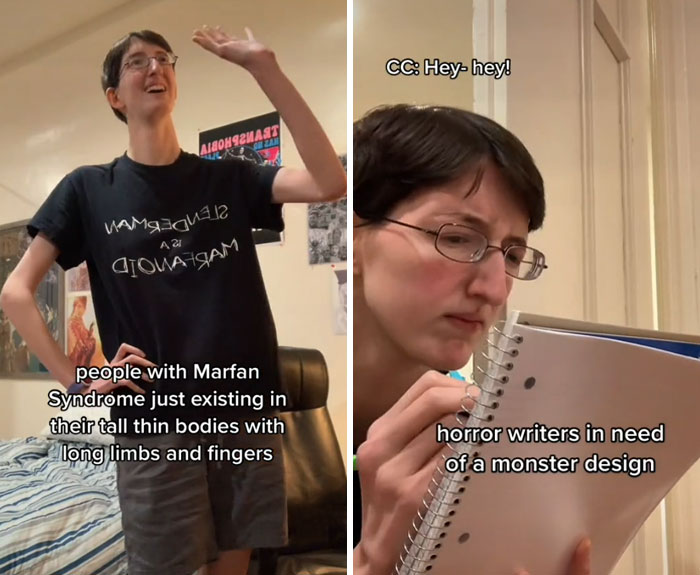
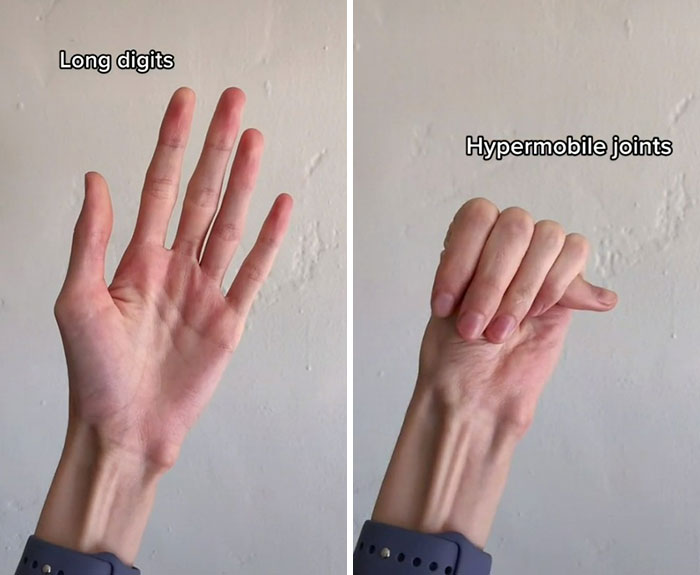
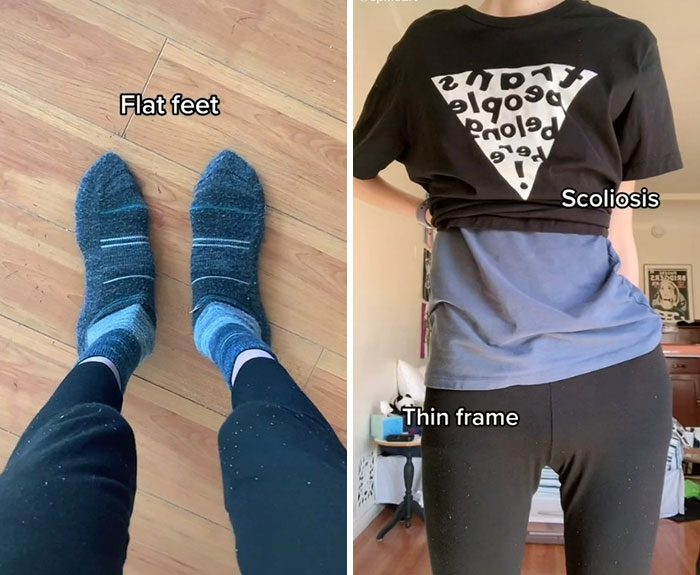
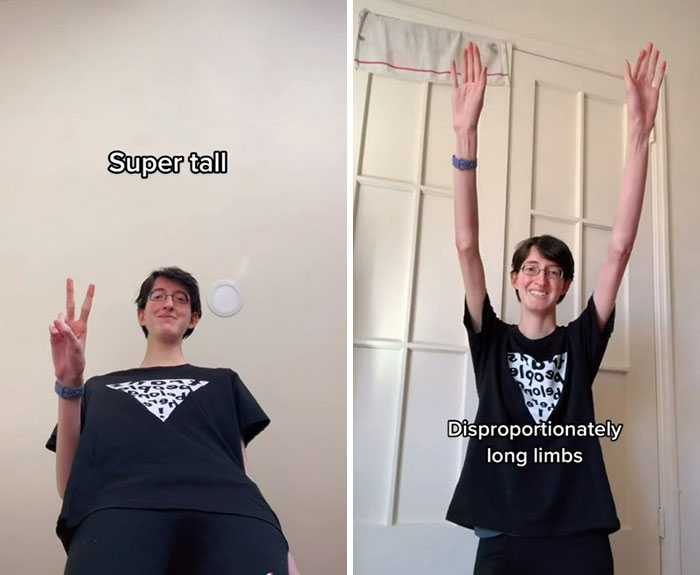
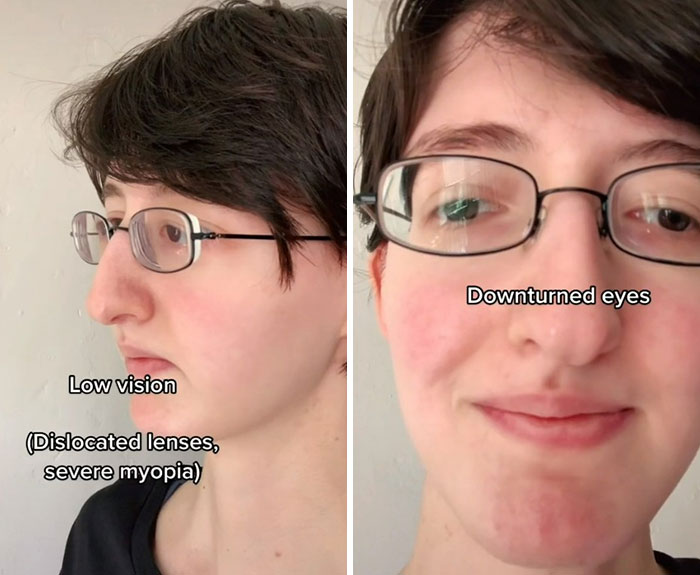
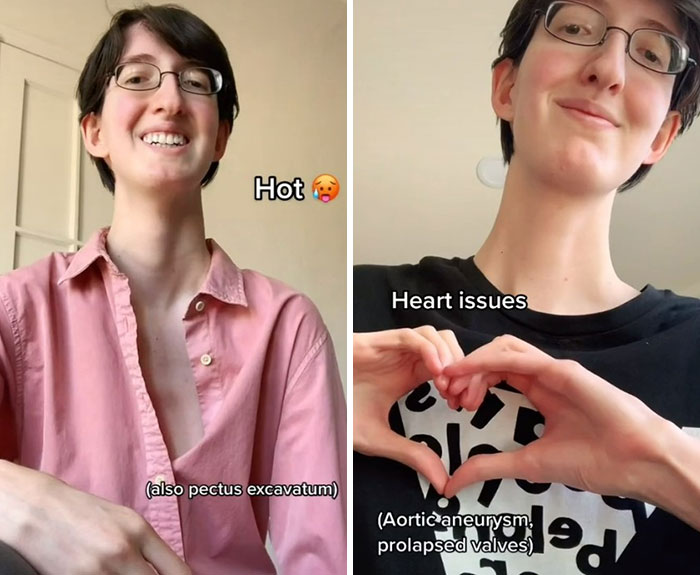
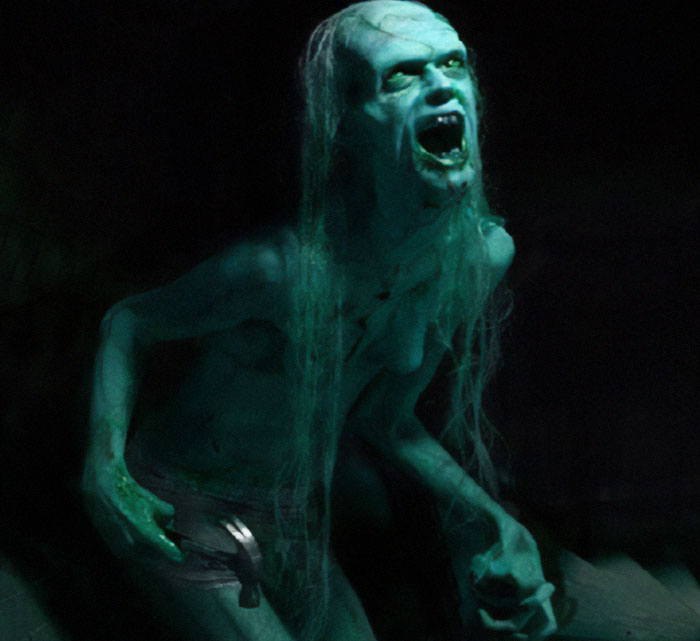
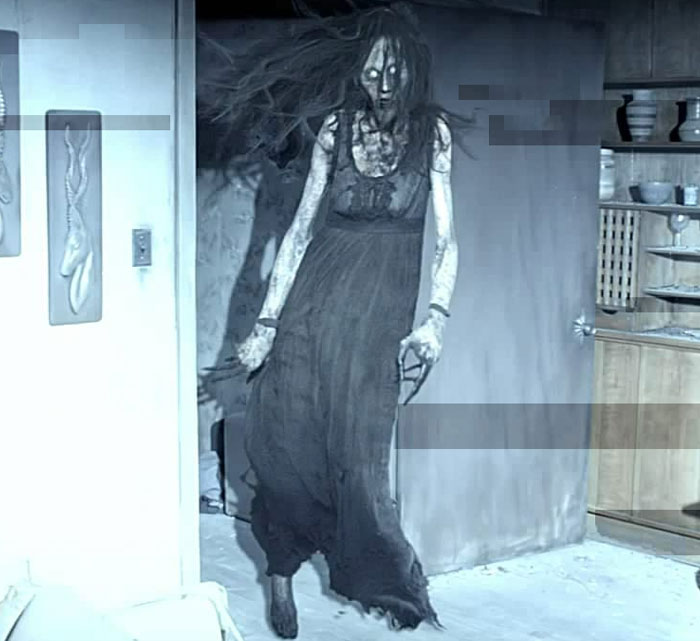
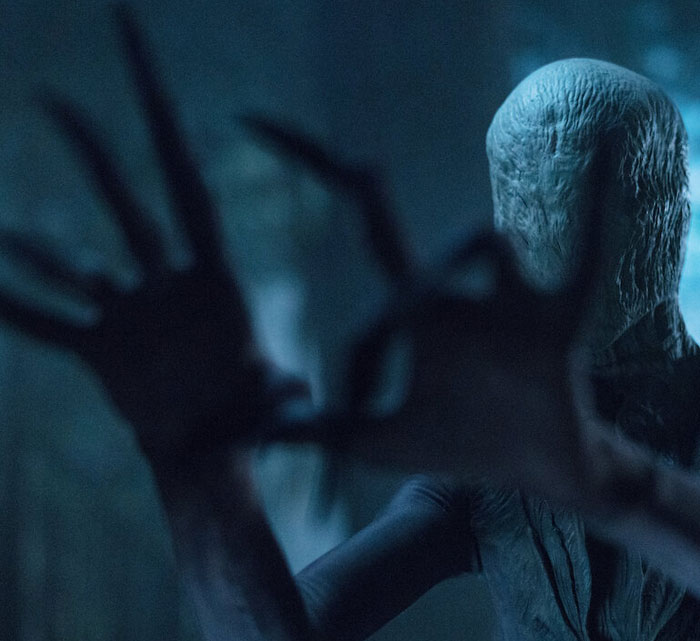
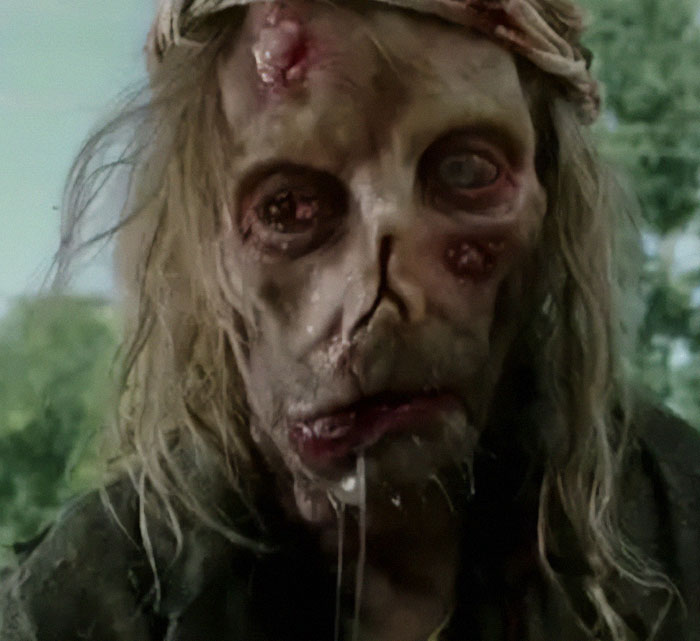
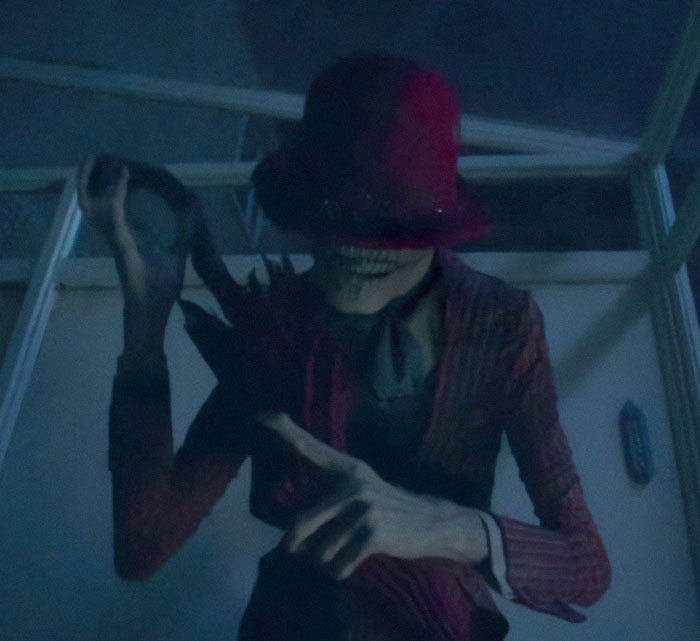
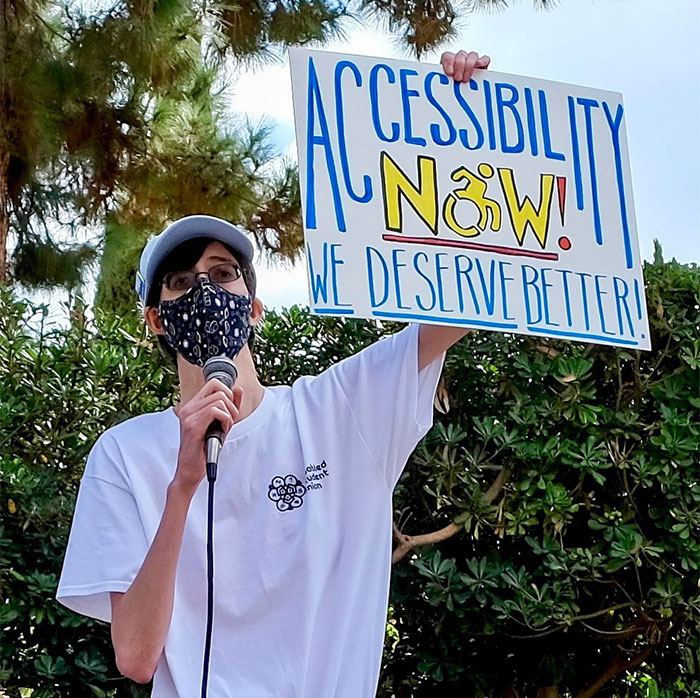
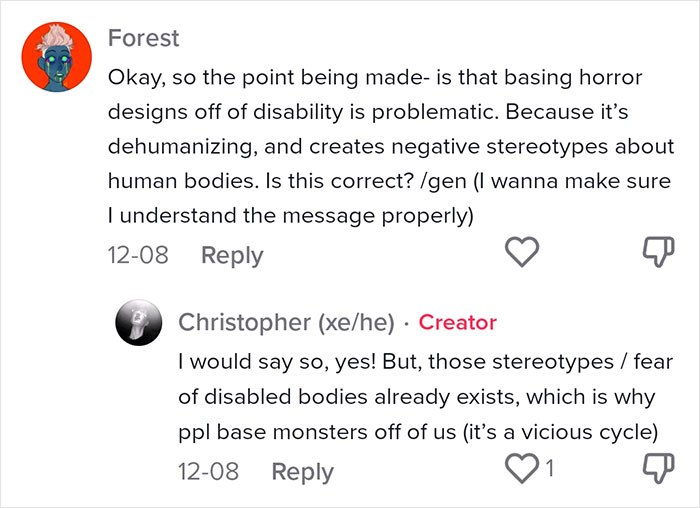








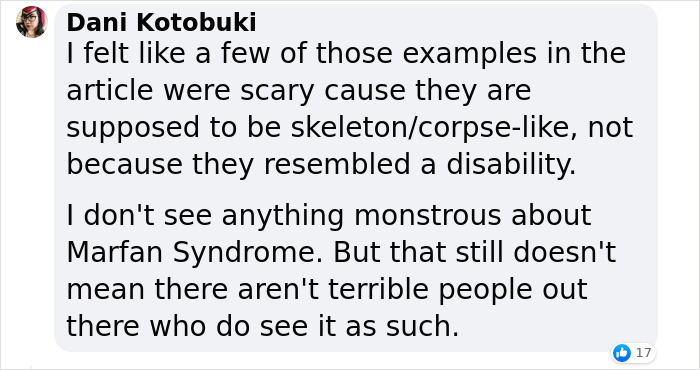
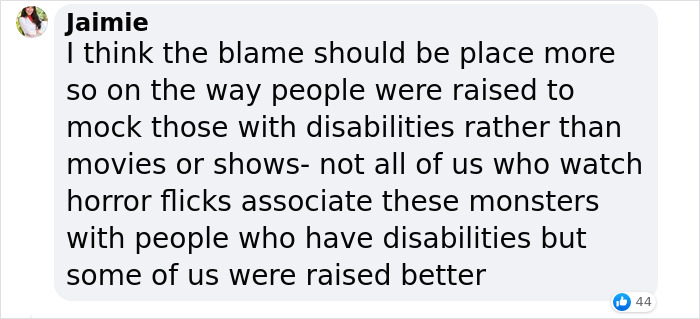
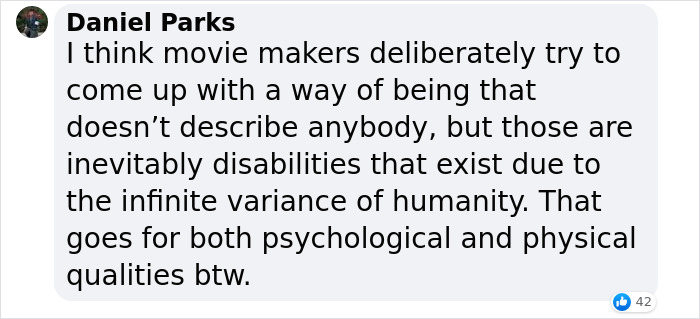











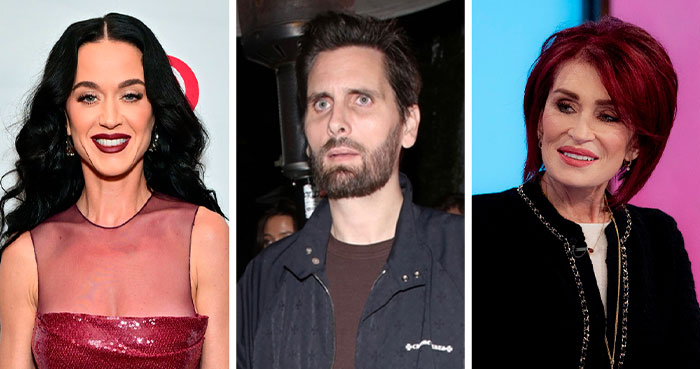
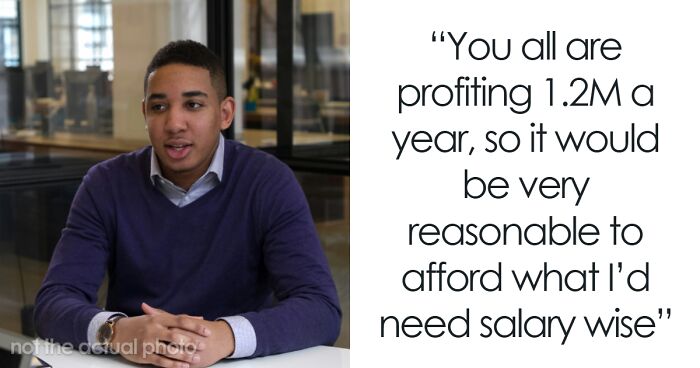
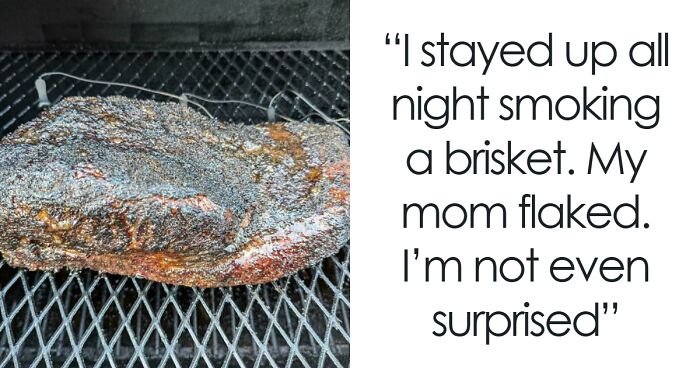
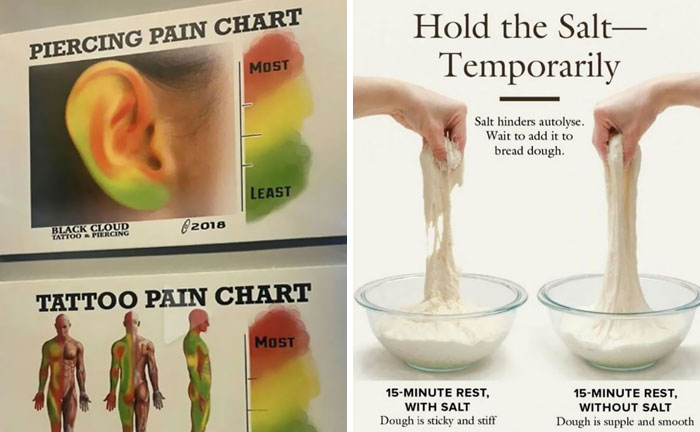
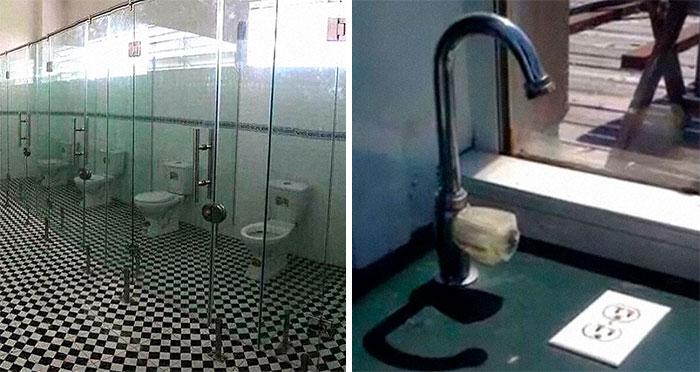
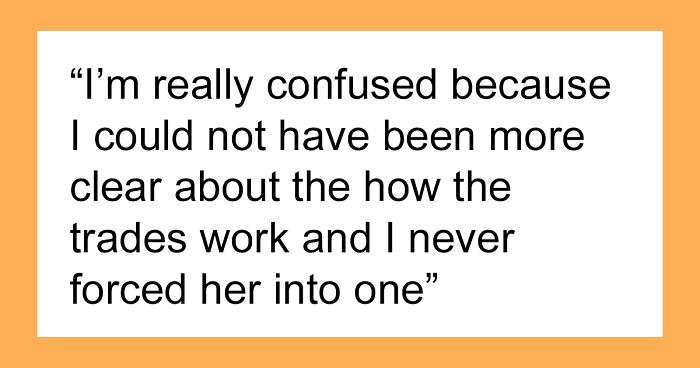


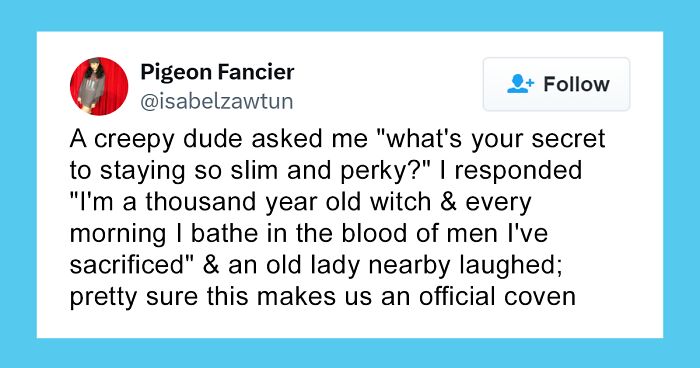
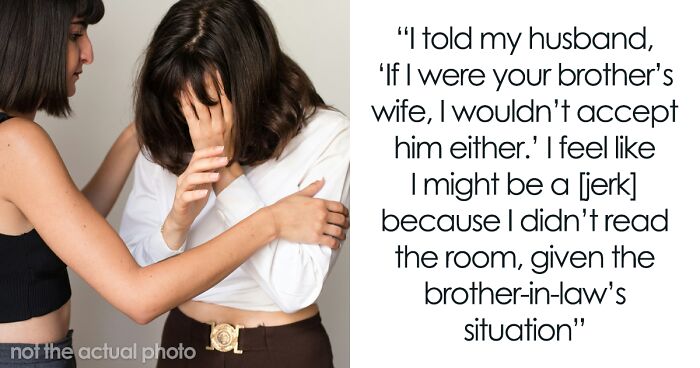
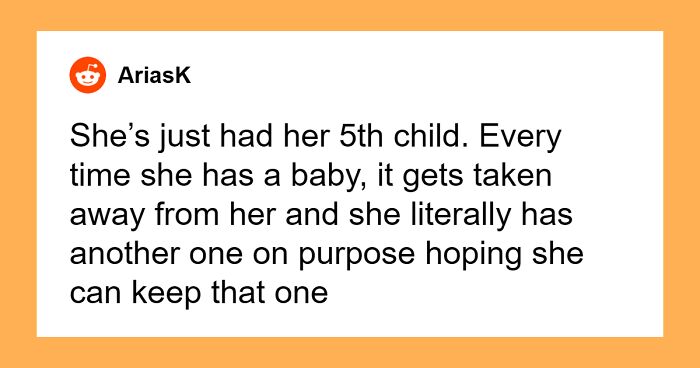
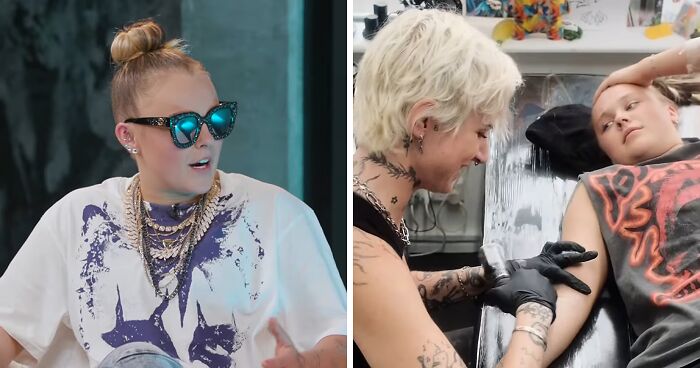
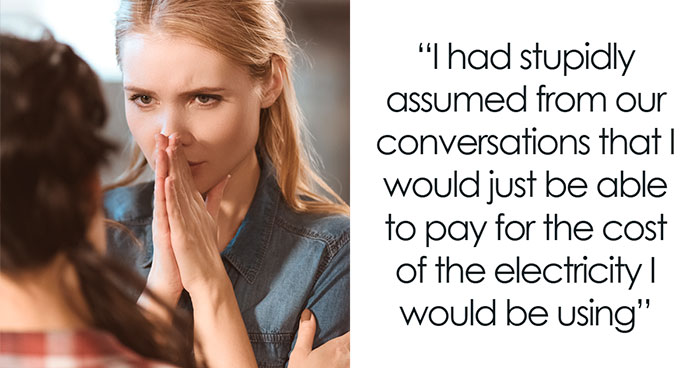
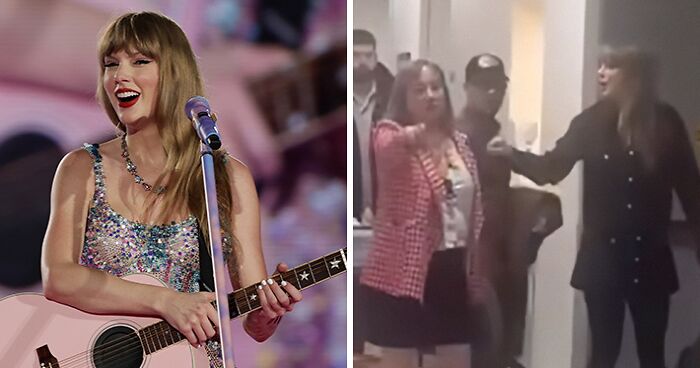
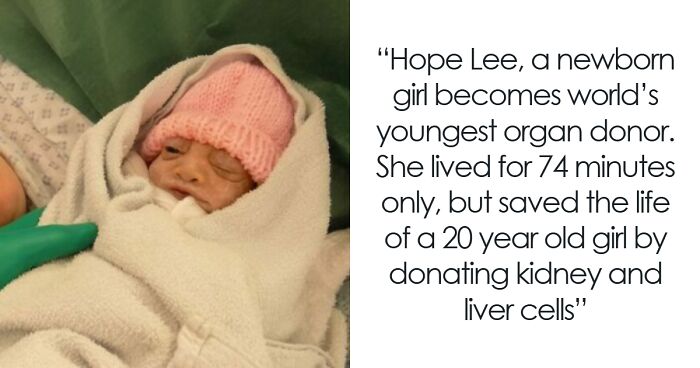
61
191